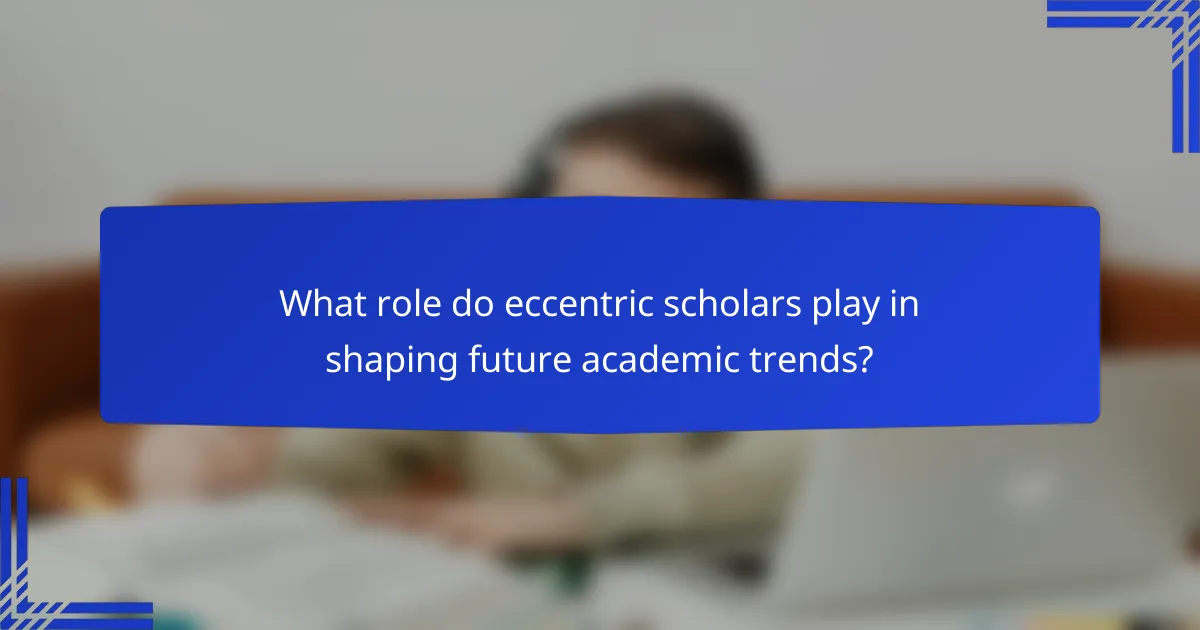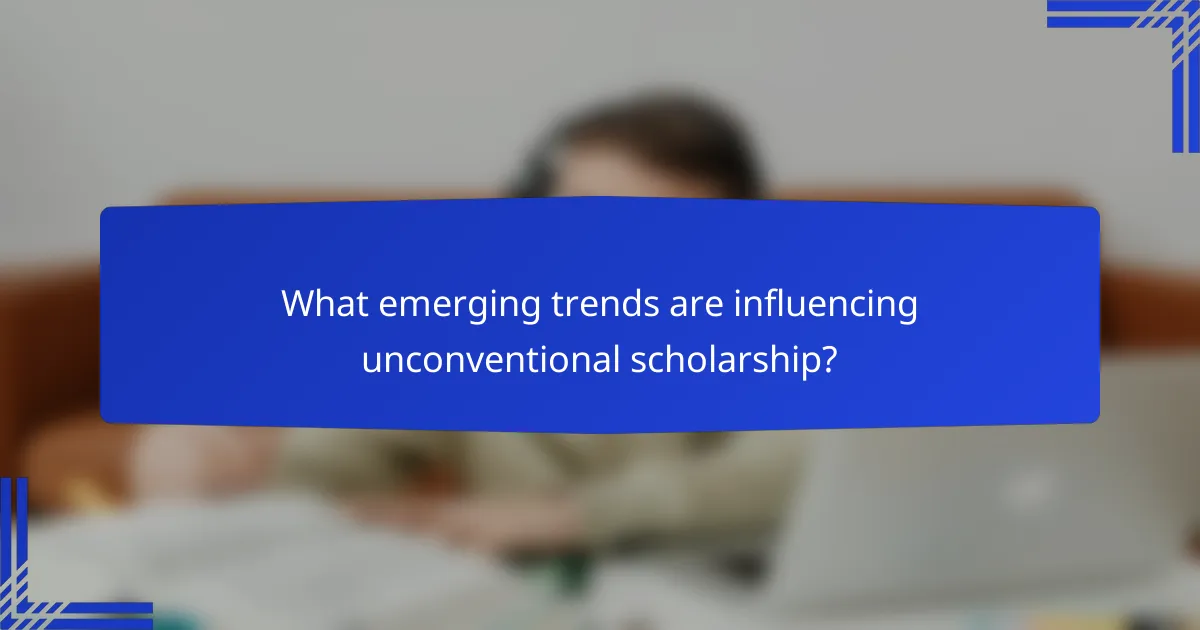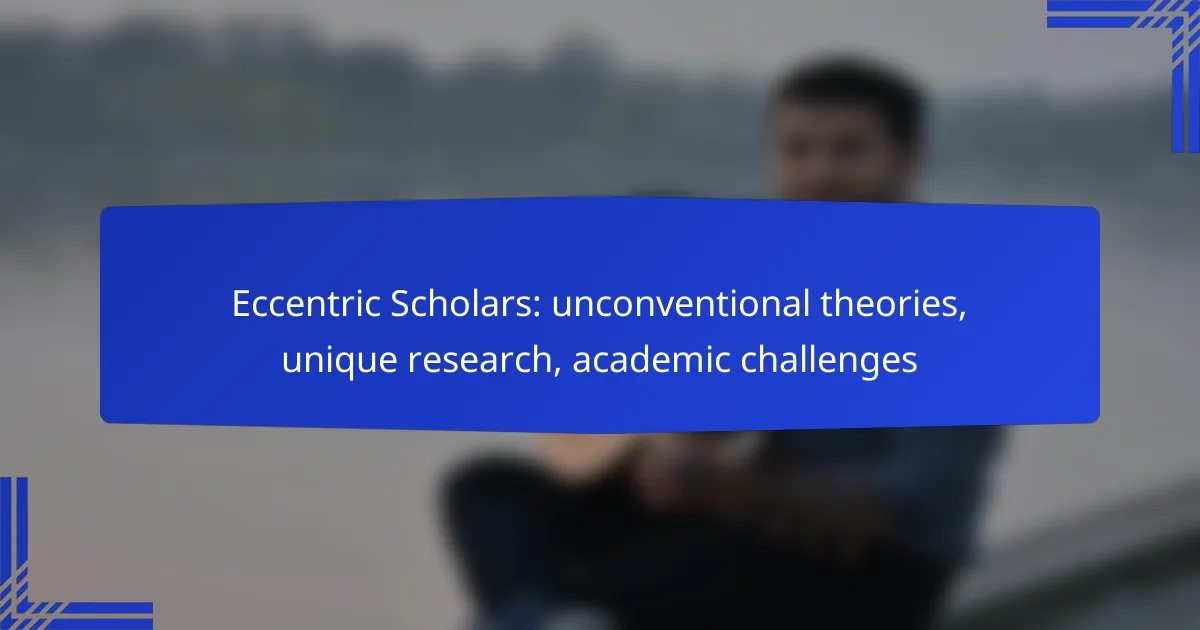Eccentric scholars push the boundaries of conventional academia by exploring unconventional theories and employing unique research methodologies. Their innovative approaches not only challenge established norms but also foster critical discussions that can lead to transformative insights across various disciplines. By integrating diverse cultural perspectives and participatory engagement, these scholars offer a richer understanding of complex social phenomena.

What unconventional theories are explored by eccentric scholars in Canada?
Eccentric scholars in Canada explore a variety of unconventional theories that challenge traditional academic norms. These theories often intersect with unique cultural perspectives and innovative methodologies, leading to fresh insights across disciplines.
Postmodernism in Canadian Literature
Postmodernism in Canadian literature emphasizes the fragmentation of narrative and the questioning of established truths. Scholars examine how Canadian authors utilize metafiction and intertextuality to reflect the complexities of identity and culture in a diverse society.
Notable works include those by authors like Margaret Atwood and Thomas King, who often blend genres and styles to challenge readers’ perceptions. This approach encourages readers to engage critically with the text and consider multiple interpretations.
Indigenous Knowledge Systems
Indigenous knowledge systems offer alternative frameworks for understanding the world, rooted in the experiences and traditions of Indigenous peoples. Scholars advocate for integrating these systems into academic discourse, emphasizing their value in areas such as environmental science and social justice.
For instance, concepts like “Two-Eyed Seeing,” which combines Indigenous and Western scientific perspectives, illustrate the potential for collaborative knowledge creation. This approach fosters respect for Indigenous cultures while enriching academic research.
Quantum Theory in Social Sciences
Quantum theory is increasingly applied to social sciences, proposing that human behavior can be understood through the lens of quantum mechanics. Scholars investigate how concepts like uncertainty and entanglement can explain complex social interactions and decision-making processes.
This perspective encourages researchers to consider the fluidity of social phenomena and the interconnectedness of individuals within society. It challenges traditional deterministic views, suggesting that social outcomes are often probabilistic rather than fixed.

How do eccentric scholars challenge traditional academic norms?
Eccentric scholars often challenge traditional academic norms by introducing unconventional theories and unique research methodologies. Their approaches can disrupt established paradigms, prompting critical discussions and reevaluations of accepted knowledge.
Interdisciplinary Research Approaches
Eccentric scholars frequently employ interdisciplinary research approaches, merging insights from various fields to create innovative solutions. For example, a scholar might integrate psychology and environmental science to explore how urban green spaces affect mental health.
This blending of disciplines encourages collaboration and can lead to breakthroughs that single-discipline studies might overlook. However, it requires scholars to navigate different terminologies and methodologies, which can be challenging.
Critiques of Standardized Testing
Many eccentric scholars critique standardized testing, arguing it fails to capture diverse intelligences and learning styles. They suggest that these tests often prioritize rote memorization over critical thinking and creativity, which can disadvantage students with different strengths.
Alternatives to standardized testing include portfolio assessments, project-based evaluations, and peer reviews. These methods can provide a more comprehensive view of a student’s abilities, though they may require more resources and time to implement effectively.

What unique research methods are used by unconventional academics?
Unconventional academics often employ unique research methods that diverge from traditional approaches, focusing on participatory engagement and personal reflection. These methods allow for deeper insights and a more holistic understanding of complex social phenomena.
Participatory Action Research
Participatory Action Research (PAR) involves researchers collaborating with community members to identify issues and develop solutions. This method emphasizes co-creation, where participants actively contribute to the research process, ensuring that their voices are heard and valued.
Key steps in PAR include defining the research problem together, collecting data through interviews or surveys, and implementing action plans based on findings. This approach can lead to more relevant and impactful outcomes, especially in social sciences and community studies.
Common pitfalls include underestimating the time required for genuine collaboration and failing to maintain transparency with participants. Researchers should prioritize building trust and ensuring that all voices are represented throughout the process.
Autoethnography Techniques
Autoethnography is a qualitative research method where scholars reflect on their personal experiences to gain insights into cultural phenomena. This technique blends autobiography with ethnographic analysis, allowing researchers to explore the intersection of personal and social contexts.
To effectively use autoethnography, researchers should focus on narrative storytelling, critical reflection, and connecting personal experiences to broader cultural themes. This method can be particularly useful in fields like sociology, education, and cultural studies.
Researchers should be cautious about balancing personal narrative with academic rigor. It’s essential to maintain a clear connection between personal insights and the larger cultural implications to ensure the research remains credible and relevant.

What are the benefits of embracing eccentric scholarship?
Embracing eccentric scholarship can lead to groundbreaking discoveries and innovative solutions. By thinking outside conventional frameworks, scholars can challenge existing paradigms and inspire new avenues of research.
Fostering Innovation
Eccentric scholarship often leads to innovation by encouraging unconventional thinking. Scholars who explore unique theories can develop novel approaches to problems, which may not be addressed by traditional methods. For instance, a researcher might apply principles from art to scientific inquiry, resulting in creative breakthroughs.
To foster innovation, it is crucial to create an environment that supports risk-taking and experimentation. Institutions can encourage this by providing funding for unconventional projects and allowing flexibility in research agendas. Engaging with interdisciplinary teams can also enhance the innovative potential of eccentric ideas.
Encouraging Diverse Perspectives
Embracing eccentric scholarship promotes diverse perspectives, enriching academic discourse. Scholars from various backgrounds and disciplines can contribute unique insights, challenging dominant narratives and broadening understanding. This diversity can lead to more comprehensive solutions to complex issues.
To effectively encourage diverse perspectives, academic institutions should prioritize inclusivity in their hiring practices and research initiatives. Hosting interdisciplinary conferences and workshops can also facilitate the exchange of ideas among scholars with different viewpoints. By valuing and integrating these perspectives, the academic community can enhance its overall impact and relevance.

What academic challenges do eccentric scholars face in Canada?
Eccentric scholars in Canada often encounter significant challenges, including limited funding opportunities and institutional resistance to unconventional theories. These obstacles can hinder their research and limit the impact of their unique contributions to academia.
Funding Limitations
Funding limitations are a major hurdle for eccentric scholars in Canada, as traditional grant agencies typically favor established theories and methodologies. This can result in a lack of financial support for innovative research that deviates from conventional academic norms.
Many eccentric researchers may find themselves relying on smaller grants or personal funds, which can restrict the scope and scale of their projects. To navigate this landscape, scholars should explore niche funding sources, such as private foundations or crowdfunding platforms, that may be more open to unconventional ideas.
Institutional Resistance
Institutional resistance is another significant challenge faced by eccentric scholars in Canada. Universities and research institutions often prioritize mainstream research agendas, which can marginalize unconventional theories and unique methodologies.
To overcome this resistance, scholars should actively engage with their institutions by presenting their research in ways that align with existing academic frameworks. Building a network of supportive colleagues and seeking interdisciplinary collaborations can also help in gaining acceptance for unconventional ideas.

How can eccentric scholars gain visibility and support?
Eccentric scholars can gain visibility and support by leveraging modern communication tools and forming strategic partnerships. Engaging with diverse audiences and collaborating with unconventional institutions can enhance their reach and credibility.
Utilizing Social Media Platforms
Social media platforms are powerful tools for eccentric scholars to showcase their unique theories and research. By creating engaging content that resonates with specific audiences, they can build a following and attract interest from both peers and the public.
Platforms like Twitter, Instagram, and TikTok allow for creative expression and can facilitate discussions around unconventional ideas. Regularly posting updates, sharing insights, and interacting with followers can significantly increase visibility.
To maximize impact, scholars should focus on consistency and authenticity in their online presence. Using relevant hashtags and participating in trending conversations can further enhance their reach.
Collaborating with Non-Traditional Institutions
Collaborating with non-traditional institutions, such as art collectives, community organizations, or tech startups, can provide eccentric scholars with unique platforms to present their work. These partnerships often allow for innovative approaches to research dissemination and engagement.
For example, a scholar studying alternative education methods might partner with a local community center to implement and test their theories in real-world settings. This not only validates their research but also fosters community involvement.
When seeking collaborations, scholars should consider the mission and audience of potential partners to ensure alignment. Clear communication and mutual goals are essential for successful partnerships that can enhance visibility and support.

What role do eccentric scholars play in shaping future academic trends?
Eccentric scholars often challenge conventional wisdom, introducing innovative theories that can redefine academic discourse. Their unconventional approaches stimulate new lines of inquiry, influencing both research directions and educational practices.
Influencing Policy Changes
Eccentric scholars can significantly impact policy by advocating for unconventional ideas that address pressing societal issues. For instance, a researcher proposing radical changes in environmental policy may draw attention to overlooked solutions, prompting lawmakers to reconsider existing regulations.
These scholars often engage with policymakers, presenting their findings in accessible formats. By simplifying complex theories, they make it easier for decision-makers to understand and implement new policies that reflect innovative academic insights.
Driving Public Engagement in Research
Unconventional theories can captivate public interest, driving engagement with academic research. Eccentric scholars often utilize social media and public forums to share their ideas, making complex topics relatable and stimulating discussions beyond academia.
Additionally, they may collaborate with artists, filmmakers, or community organizations to present their research in creative ways. This approach not only broadens the audience but also encourages public participation in scientific discourse, fostering a culture of curiosity and inquiry.

What emerging trends are influencing unconventional scholarship?
Emerging trends such as technological integration, interdisciplinary collaboration, and open-access publishing are significantly shaping unconventional scholarship. These trends facilitate innovative research methods and broaden the scope of academic inquiry.
Integration of Technology in Research
The integration of technology in research is transforming how scholars approach unconventional theories. Tools like artificial intelligence, data analytics, and virtual reality enable researchers to analyze complex datasets and visualize concepts in new ways.
For instance, AI can assist in identifying patterns in large volumes of literature, while virtual reality can provide immersive experiences for experimental studies. Scholars should consider the balance between traditional methodologies and technological advancements to maintain rigor in their research.
When adopting new technologies, researchers should ensure they have the necessary skills or collaborate with tech-savvy colleagues. Common pitfalls include over-reliance on technology without understanding its limitations and neglecting ethical considerations in data usage.
